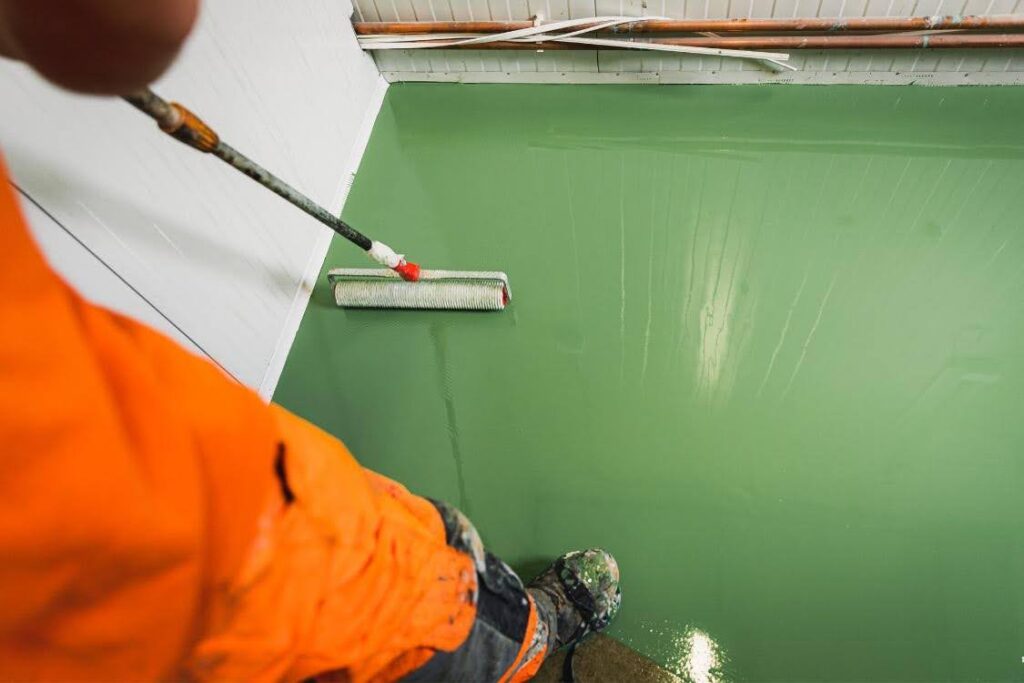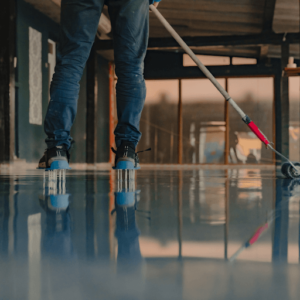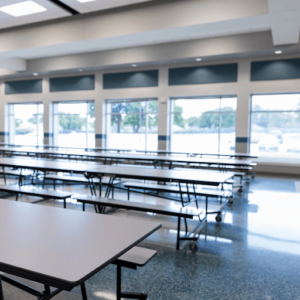
Metallic Epoxy Floor | Top Flooring for Florida Homes & Garages
Upgrade your space with a metallic epoxy floor. Perfect for Florida garages and homes. Get

September 4, 2024

Garage floors often bear the brunt of heavy use and frequent spills, ranging from oil and grease to solvents and coolants. To protect these surfaces effectively, epoxy applications emerge as a superior solution among many traditional flooring options. This type of flooring not only features a beautiful finish, but it can also withstand the harsh conditions of your garage.
In this article, we will explore the comprehensive benefits of chemical resistant epoxy flooring and why it offers a level of protection that can withstand even the most demanding industrial settings.
Chemical-resistant garage epoxy floors provide several key advantages that make them a smart choice for any garage space:
Choosing chemical-resistant floor coatings such as epoxy, means investing in a solution that will provide safety, ease of maintenance, and durability, all while enhancing the aesthetic appeal of your space. It’s a practical improvement that adds value to both commercial and residential properties.
When it comes to protecting your garage with chemical resistant flooring systems – epoxy flooring offers a superior solution. Among the wide variety of traditional garage floor coatings, epoxy provides unmatched durability and resilience in the face of chemical spills, stains, and damage.
Epoxy finish garage floors are specially formulated with a blend of resins and hardeners, resulting in a strong and resilient surface. This seamless and glossy finish not only enhances the appearance of your garage but also provides a protective barrier against chemicals and other substances that can deteriorate traditional concrete surfaces.
Epoxy floor coatings are particularly useful in places like garages where floors often come into contact with harsh chemicals. Let’s take a closer look at why epoxy flooring offers excellent resistance versus chemical damage:
Epoxy flooring surfaces are especially durable because they can withstand chemical damage. This makes it last longer and reduces the need for frequent repairs, which is especially useful in places where chemical spills are common. Its protective nature helps keep the floor looking great, as it resists stains and doesn’t break down easily when exposed to harsh chemicals.
When it comes to improving the chemical resistance of epoxy flooring, specific additives are crucial for adapting the floor to withstand harsh environments found in industrial plants, laboratories, and garages.
Incorporating these sophisticated additives is made possible by EliteCrete Systems to ensure their epoxy flooring solutions meet the high demands of various industrial applications. Their approach not only guarantees the longevity and safety of the flooring but also underscores their commitment to quality and innovation in protective surface solutions.
Chemical-resistant epoxy flooring stands out as an exceptional choice for garage environments that frequently encounter surface stress, chemical spills, and heavy usage. This flooring option is not just durable but also equipped with a robust resin composition and enhanced by additives like polyurethane and vinyl ester, offering unmatched resistance to chemicals.
However, to fully benefit from these features, your garage epoxy floor must be installed correctly by professionals. At Apex Flooring, we bring precision and specialized skills to every project as proven by the satisfaction from our reviews. Our team is committed to providing a high-quality professional finish and a seamless application of your epoxy floors that are customized to meet the unique needs of your space. For your peace of mind, we offer a lifetime warranty along with a fully free consultation.
Unlike other garage floor coatings, chemical-resistant epoxy flooring is formulated with specialized ingredients that make it highly resistant to chemicals and provide exceptional durability. It creates a seamless and glossy finish that not only enhances the appearance of your garage but also adds an extra layer of protection
It is recommended to hire professional garage floor coating contractors for installation if you want to ensure a flawless and long-lasting professional finish. They have the expertise and specialized equipment to properly prepare the concrete surface, apply the epoxy coating evenly, and address any potential issues that may arise during the installation process. Hiring professionals guarantees a high-quality result that will stand the test of time.
The process of installing chemical-resistant epoxy flooring typically involves the following steps: surface preparation, which includes cleaning and repairing any existing cracks or damage on the concrete floor; applying a primer coat to promote adhesion; applying the epoxy coating using a roller or sprayer; and allowing it to cure for the recommended timeframe. It is important to follow the manufacturer’s instructions and use proper safety precautions during installation.
Absolutely! One of the major advantages of epoxy flooring is its easy maintenance. Its non-porous, smooth surface enables it to have excellent stain resistance properties. Which allows for quick and effortless cleaning. Simply sweep away dirt and debris or use a mild detergent and water solution for thorough cleaning.
When properly installed and maintained, it can last for 10-20 years, providing long-lasting protection to your garage floor. Its high resistance to chemicals, impact, and abrasion ensures durability, even in high-traffic areas. Additionally, periodic recoating can extend the lifespan of the epoxy floor, keeping it in excellent condition.
Yes! While chemical-resistant epoxy flooring is commonly used in garages, it is also suitable for various other areas that require durable and resistant flooring. It is an excellent choice for industrial environments, warehouses, laboratories, manufacturing plants, and even residential basements. Its versatility and ability to withstand chemicals make it an ideal flooring solution for a wide range of applications.
Written By:
Michael Thompson brings a deep knowledge of polymer chemistry from his Chemical Engineering studies at Georgia Tech to the forefront of his writings. With over 20 years in the industry, his articles are rich in detail about the science behind epoxy formulations and their real-world applications, guiding professionals and DIY enthusiasts alike.

Upgrade your space with a metallic epoxy floor. Perfect for Florida garages and homes. Get

Transform your home with a durable epoxy resin garage floor in just one day. Follow

Transform your home with a durable epoxy resin garage floor in just one day. Follow
Get In Touch
Get a Free Epoxy Flooring Estimate

Providing epoxy flooring services for homes & businesses across Florida, Atlanta GA, and Charleston SC.
Quick Links
Copyright © 2025 Apex Flooring, LLC, All Rights Reserved.

For just $2,700, give your 3-car garage a professional epoxy flooring finish backed by our lifetime warranty. Fill out this form below to take advantage of this limited time offer!
For just $2,300, give your 2-car garage a professional epoxy flooring finish backed by our lifetime warranty. Fill out this form below to take advantage of this limited time offer!
For just $2,700, give your 3-car garage a professional epoxy flooring finish backed by our lifetime warranty. Fill out this form below to take advantage of this limited time offer!
For just $2,300, give your 2-car garage a professional epoxy flooring finish backed by our lifetime warranty. Fill out this form below to take advantage of this limited time offer!
Ready to upgrade your garage with Apex Epoxy Flooring? Fill out the form below, and let us handle the rest. Whether it’s a 2-car or 3-car garage, we’re here to deliver top-notch service.